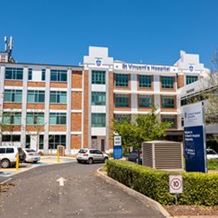Patient resources Speech Pathology- Apraxia

- Home
- Our Hospitals
- St Vincent’s Private Hospital Toowoomba, QLD
- Patient Information
- Speech Pathology- Apraxia
Important information for all patients
Please read prior to admission
Apraxia is caused by damage to the movement control centres of the brain, resulting in difficulties being able to plan the rapid movements needed to form sounds and words.
A person may know exactly what they want to say, but the signals from the brain to the muscles are disrupted and they cannot achieve the movements to produce the correct sounds. This may result in a person saying something completely different from the intended word and it may even be made up. For example, a person may say “chicken” or even “bipem” instead of “kitchen”.
This is not due to muscle weakness, but rather, involuntary control of planned movement.
The severity of apraxia can range from slight difficulty saying the sounds of words correctly to extreme difficulty and not being able to say words at all. Apraxia is not always isolated to speech and may also effect gesture. The severity of the Apraxia depends on what type and extent of brain damage.
Apraxia can happen on its own or at the same time as other speech or language problems such as dysarthria and aphasia.
Apraxia may be caused by:
- Stroke
- Head Injury
- Neurosurgery
- Brain tumours
- Dementia
Characteristics of Apraxia
- Imitation - difficulty imitating and saying sounds on your own
- Inconsistent - Able to say a word correctly sometimes, but incorrectly other times.
- Groping - moving your tongue and lips to get them into the right place as you try to say sounds
- Slow - Speak more slowly
- Automatic speech is easier – utterances that you say all the time like “Hello” or “How are you?”
- In more severe cases, not being able to say any sounds at all
Tips for communicating with someone with Apraxia
- Modify the environment: reduce background noise e.g., turn off the TV/radio), find a quiet place to talk.
- Remember that the person’s intelligence is not affected; they just have a problem with speaking.
- Allow the person plenty of time to talk, make eye contact and face them directly.
- Accept alternate modes such as gesture, body language and tone of voice as communication. Do not pressure a person to use speech, as this may increase their frustration and reduce their likelihood of using their limited speech.
- Be prepared for fluctuations in communication ability from day to day.
- Take break from communication-based activities; instead, listen to music, walk in the garden, or try craft and hobbies as outlets.
For more information
- Contact a speech pathologist at St Vincent's Toowoomba- 07 4690 4052
- Talk to your doctor




